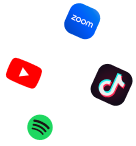
Apps that Collect Data
- Free Apps: 56.07%10.66 Data Points
- Paid Apps: 13.06%5.93 Data Points
56.07% of all free iOS apps have declared that they collect privacy data. This amounts to 1,131,401 apps. However, this also means that 43.93%, or 886,568 apps, have not declared that they collect privacy data. Moreover, if a free app collects privacy data, it will collect an average of 11 data types.
13.06% of paid iOS apps have declared that they collect privacy data. This amounts to 13,388 apps. However, this also means that 86.94%, or 89,147 apps, have not declared that they collect privacy data. In addition, if a paid app collects privacy data, it will collect an average of 6 data types.




